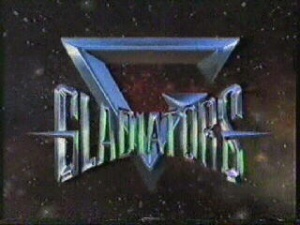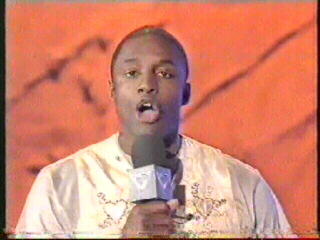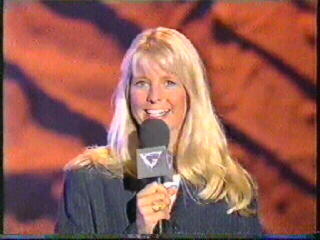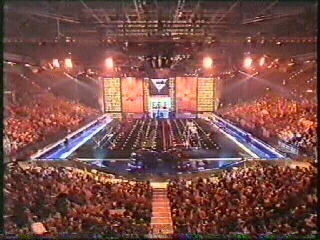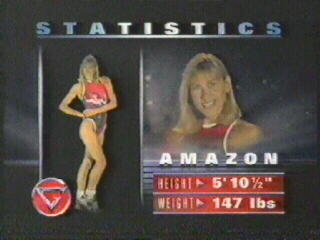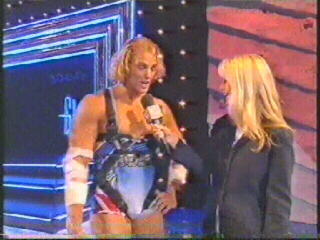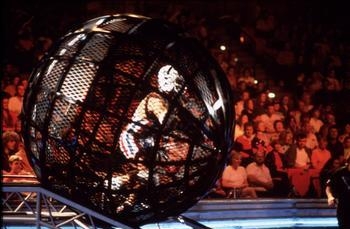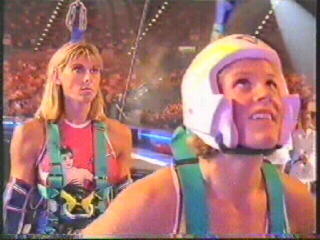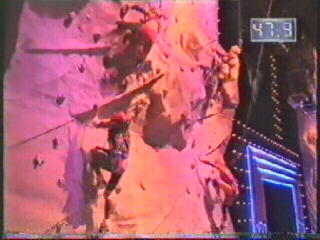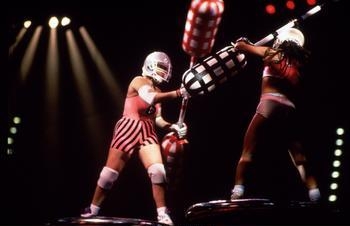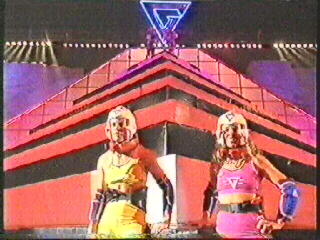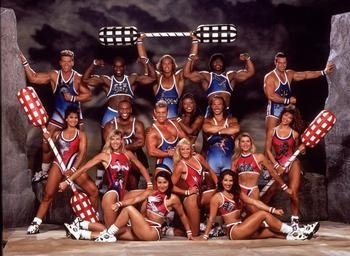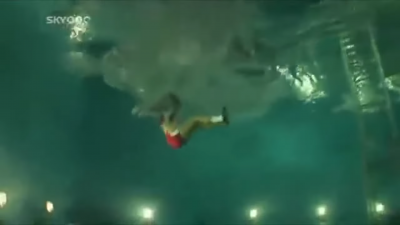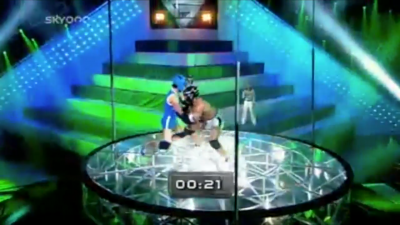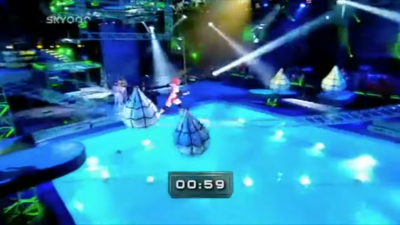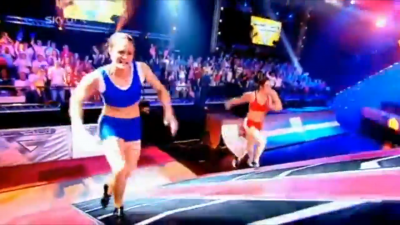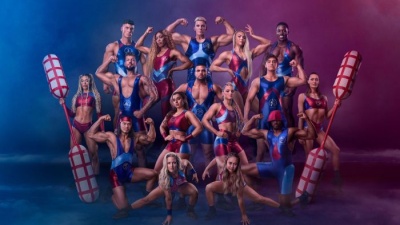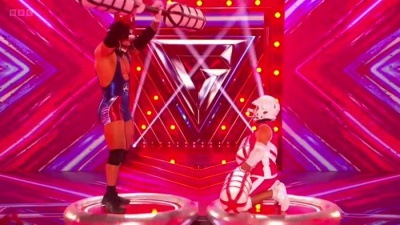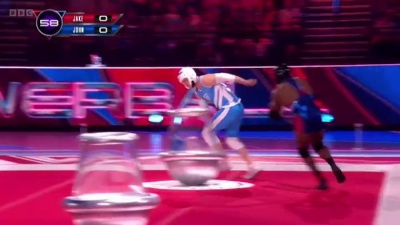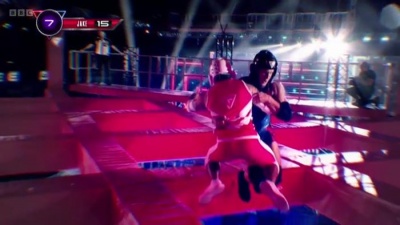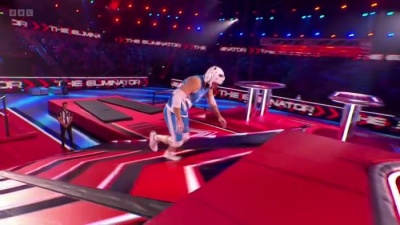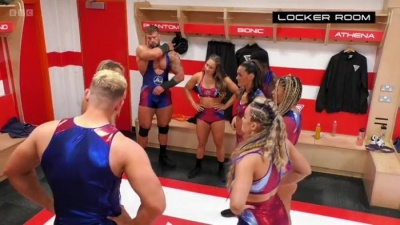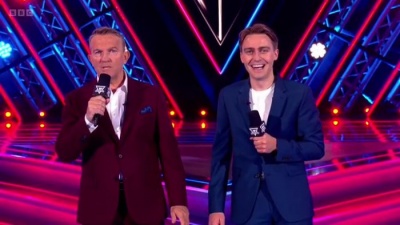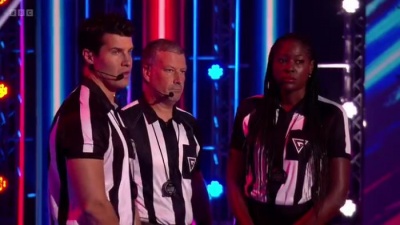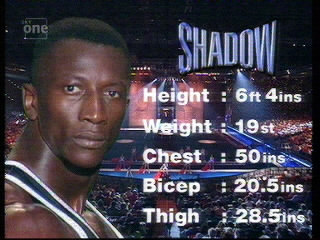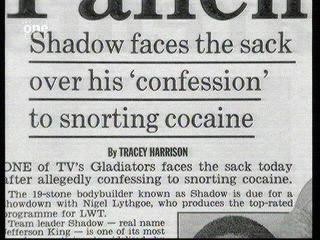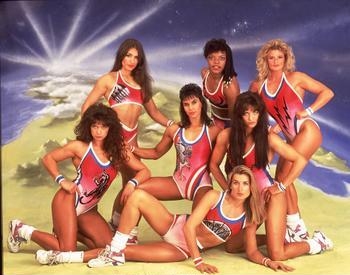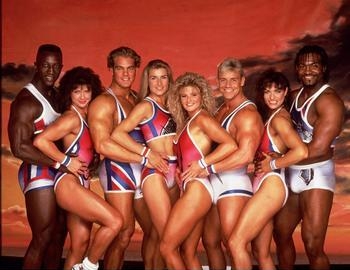Gladiators
Host
Ulrika Jonsson (1992-99) with:
John Fashanu (1992-96, 1999)
Jeremy Guscott (1997-98)
International Gladiators:
Mike Adamle (from American Gladiators) (1994-95)
John Fashanu (1994)
Ulrika Jonsson (1995)
Kimberley Joseph (from Australian Gladiators) (1995)
The Ashes:
John Fashanu and Kimberley Joseph (1995)
Ulrika Jonsson and Mike Hammond (from Australian Gladiators) (1996)
Springbok Challenge:
Ulrika Jonsson and Glenn Hicks (from South African Gladiators)
Ian Wright (2008-09) with:
Kirsty Gallacher (2008)
Caroline Flack (2009)
Barney and Bradley Walsh (2024-)
Co-hosts
Commentator:
John Sachs (1992-99)
Alan Parry (2008-09)
Guy Mowbray (2024-)
Referee:
John Anderson (1992-99, 2008)
John Coyle (2009)
Mark Clattenburg (2024-)
Sonia Mkoloma (2024-)
Lee Phillips (2024-)
Team Manager:
Michael Van Wijk (2009)
Broadcast
LWT in association with The Samuel Goldwyn Company for ITV, 10 October 1992 to 1 January 2000 (102 episodes in 8 series + 10 specials)
as International Gladiators, 7 January 1995 to 8 June 1996 (14 episodes in 2 series)
as The Ashes, 30 December 1995 to 1 February 1997 (6 episodes in 2 series)
as Springbok Challenge, 3 to 17 January 1998 (3 episodes in 1 series)
Shine for Sky One, 11 May 2008 to 25 October 2009 (27 episodes in 2 series + 8 specials)
Hungry Bear Media and MGM Alternative for BBC One, 13 January 2024 to present
Synopsis
Gladiators... are you ready?
A pair of male and a pair of female preternaturally fit but otherwise perfectly normal members of the public (many with trifling claims to fame like being world kick-boxing champion, representing their country at diving, playing professional rugby or somesuch) adopt the role of con-ten-derrrrs to take on the might of trained Gladiators with similarly awesome names in a series of pseudo-combative events, aiming to earn as many points as possible. The contender with most points from each pair earns a half-second head-start for each point difference in a race over a fearsome oversized assault course. John Sachs provides crazed voiceover commentary while Ulrika and whoever is the resident sporty bloke at the time provide rich tea and sympathy with interviews between the events.
Sounds naff? It was one of the defining game shows of the 1990s and not without good reason. The show is derived from the original American Gladiators which, contrary to expectations, had only a tiny fraction of the glitz, glamour and budget of the interpretations of the format in the rest of the world - and a pathetically small arena, too.
The Gladiators themselves
A handful of Gladiators survived all seven series including the true beauty of the piece, the stunning Lightning (female); the lithe and lissom yet clownsome Cobra (male), the cheerful, reliable dreadlocked Saracen (fireman) and the good old-fashioned panto baddie Wolf (canine).
The rest of the female Glads have been rather anonymous, save for original pin-up Jet, who has since plummeted into obscurity using her real name Diane Youdale, and the occasional appearance for a season or two by random jobbing Olympian medallists.
The male gladiators have more defined charisma: Hunter has a broad smile, ridiculous ability at every single damn game and a silly accent; Shadow was claimed as being twenty stones of solid muscle and stare in the first series (though all the Glads' claimed weights fell in series two and beyond as steroid use allegations befell the show) and was the Glads' spiritual leader until scandalised by links with cocaine; Warrior was the archetypal strongman who played hard but fair; Rhino "is six feet tall... but he's nine feet wide!" and so forth.
Gladiators: A potted history
When it first appeared in the UK it was new, it was fresh and it was exciting. The American version which regularly filled the extremely late night weekend slots had already gained a cult reputation and when the British version hit the scene it set a new standard for glamour, glitz and fun for Saturday evening shows.
Up against the almost as exciting (at the time) Noel's House Party (i.e. when it was actually good) British audiences had never seen the likes of grown men and women hitting each other over the heads with outsize cotton buds, rolling around in giant Hamster balls and Bungee jumping (where you got "more bounce to the ounce"). Despite the fact they played the same six games every week it still enthralled its audience. Who cares that the games didn't really have much of an effect on The Eliminator? It was fun! And got Britain fit again.
The series one games were:
Atlaspheres - One of the best games visually, but often not a high scoring game. Roll around in steel cages with the aim of rolling over one of four pods, scoring points and triggering a smoke effect into the bargain.
Wall - Contenders scramble up a climbing wall with hand and footholds while the Glads are around 15 seconds behind. Get to the top of the wall before you get pulled off by your pursuing Glad and you're ten points the richer.
Danger Zone - Contestants must dodge tennis balls being served at Sampras speed by the Gladiator standing on a large construction, atop which was a target. Players could try firing increasingly silly missiles at the target for 10 points, or just get around the course without being hit for a consolation 5.
Swingshot - Boing! In this bungee-fest, contestants had to grab yellow (1 point), blue (2 points) or red (3 points) balls from a central column then bounce back and put them in their scoring baskets. Glads would time their jumps so as to block the contestants movements.
Hang Tough - Contenders aim to swing across a grid of rings from one side to the other. Nine times out of ten, the Gladiator who starts from the other side of the grid catches up with them mid-way and pulls them off the rings.
Duel - Contender and Glad attempt to knock each other off elevated platforms with giant padded boffing sticks. Most women's duels are thirty-second defensive affairs with much thud and blunder and not a great deal of subtlety, but a men's duel is a thing of great cunning and beauty, the end appearing at any moment within the half minute.
Series two saw an extended run with loads of new games added. Now you could see grown men and women attempt to blow each other up ("Skytrak" - the standards of spelling of the nation after this series dropped dramatically), watch people whack each other over the head with different shaped outsized cotton buds ("Suspension Bridge"), watch televised Tug-O-Wars on surfboards ("Tilt") and watch a rugby match on a mini pitch with a pair of balls and baskets ("Powerball"). Then halfway through they invented Duel-on-a-Bucking-Bronco ("Joust"), and the terribly overplayed "Gauntlet". Double the amount of episodes and more viewers. Tony Blair says that Gladiators is great, but that's probably a couple of years later because he would have been an unknown then.
Series three saw the inclusion of four games, two really good and two really indifferent. "Poleaxe" involved grown adults climbing up a pole as fast as they possibly could and if you lost you were dropped 40ft onto a crash mat. This looked spectacular, though unfortunately it did someone's back in. So they put people on safety ropes in future series, which wasn't nearly as good. "Hit & Run" does exactly what the title says. "Pyramid" allowed people to see grown men and women jump up a giant Bouncy Castle (erm, a pyramid made of foam) and "Pursuit" made Kiss Chase fashionable again.
Series four included a couple of superb new games. There was the brilliant "Pendulum" which saw sales of climbing frames beat its current recession and enter a peak period and probably helped the economy no end and then there was the underplayed "Whiplash" which made a dog's dinner look like a dog's lunch.
Series five and it was beginning to get a bit tedious to be honest. I think "Sumo Ball" was invented then but it was rubbish.
Series six and worried that the general public were getting a bit bored, they invented "Tightrope", which had nothing to do with a tight-rope. It was rubbish, as despite being a spectacular game played high up in the arena, victory hinged on being able to undo a clip quickly. This all kept the public happy anyway. We liked the different shaped cotton-buds.
Series seven and sadly about this time, people had decided one thing: different shaped cotton-buds might be all well and good (because we like different shaped cotton-buds), but do we actually give a damn anymore? People were turning off in their droves. In an attempt to revive its ailing audience, they tried to make Wolf a good actor and start a few fights with his new arch nemesis Vulcan. They failed on both counts. But by about this point, no-one really cared. Except for my old IT teacher who was in the audience, because a friend of his made the semi-final...and lost.
Re-incarnations
But what of its other incarnations? International Gladiators worked for a while with Mike Adamle (of American Glads fame) hosting with the Fash. Renowned for useless contestants from Eastern Europe.
There was an Ashes series which introduced us to a range of the Australian Gladiators.
They did the Champion of Champions which a likable Scouse heroine won (see Key moments below).
There was a forces special too, with several of the armed services competing.
And then there's children's Gladiators, or more accurately Gladiators: Train to Win, which sounded like a great idea, as kids loved Gladiators! And they'd rather have kids on TV doing it safely than bashing each others brains out with pillows doing "Duel" and falling down the stairs trying to do "The Wall". Its first series was inspired by the terrible Gladiators 2000 and its tacky wholesomeness shined through. Luckily they changed it from series two onwards so it was more action packed, the hot Gladiator-on-Gladiator action was apparently "the first time it's ever been done in the world." Fantastic stuff. Oh hang on, there seems to be a pool of about 6 games which haven't changed since Series 2. Oh.
There was a one-off charity special which involved jockeys for some reason. Needless to say, they lost.
Coroner's report
So Gladiators's Cause of Death? Forensic evidence suggests lack of new and good games and suffocation in early series by playing the Wall every single flippin' week.
Gladiators Ready! (Again)
So after an eight year break, Gladiators returns, this time to Sky One, and it’s a bit of a mixed bag, with as many similarities as differences. Several features of the old show make a welcome return, while the show also stamps it’s own 21st Century identity on the format.
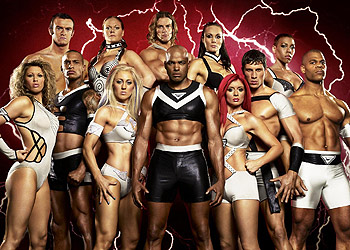 Here they come again, this time with Superstars champ Du'aine Ladejo as Predator (centre).
Here they come again, this time with Superstars champ Du'aine Ladejo as Predator (centre).The biggest difference is obviously the Gladiators themselves. The likes of Wolf, Cobra, and Lightning have been replaced with muscle-bound athletes sporting names such as Destroyer, Oblivion, and Tempest. The new Gladiators are good at what they do, and have developed on-screen personalities like the original Gladiators did, through screen time in post-event interviews.
New Place, New Face(s)
Another big difference is the venue. Smaller than the National Indoor Arena previously used, this is a purpose-built affair, with a permanent water tank, a large foam pyramid, and various other platforms and steps all permanently laid out. The audience line the sides of the studio, with them being much closer to the action than they previously were, which adds to the atmosphere. The somewhat over the top use of spotlights and lasers also helps with the atmosphere.
New presenter Ian Wright does the job well enough, and works well with his co-hosts, Kirsty Gallacher in Series 1, and Caroline Flack in Series 2. All the presenters represented good choices for the hectic, lively atmosphere the show demands. New commentator Alan Parry does well, and has started to make the role his own. A returning face from the original series, was that of long-standing referee John Anderson. However he was replaced by boxing referee John Coyle come the second series.
Bring Your Swimsuit
The events will broadly speaking be familiar to anyone who saw the original series. Duel, Hit & Run, The Wall, Pyramid, Hang Tough, Powerball, and The Gauntlet all return. They are played much to the same rules as before, with perhaps the most noticeable difference being that some events – namely Duel, Hit & Run and Hang Tough are now played above water, rather than crash mats.
The one new game is called Earthquake. This entails the contender and Gladiator attempting to push or pull their opponent from a tilting circular platform suspended above a large net. The second series added the Pursuit and Suspension Bridge events from the original series, and also added Rocketball, originating from the American revival, which entails the use of bungee cords to facilitate the throwing of balls into suspended baskets, as a pair of Gladiators try to prevent it.
Overall the games are probably some of the better ones from the previous series, and the minimal changes mean that they work as well as before. (Although we’re not sure about Britney Spears, ‘Hit Me Baby One More Time’, replacing Queen’s ‘Another One Bites The Dust’ on Duel).
The final Eliminator event borrows several features from its predecessor, but also adds some new obstacles such as diving under a flaming beam, and rolling along with what can only be described a giant cotton reel. This obstacle - that only one person (Gladiator 'Atlas' on a Legends special) ever managed to complete successfully - was removed by the second series. The overhead hand bike and the zip line both return, as does the Travelator, which was joined by a somewhat over-hyped floor Travelator in the second series. Unfortunately both look a bit weak compared to the old version. Also, trading the final paper burst for pushing through foam cubes is an interesting choice.
It’s hard to judge the revived show without making comparisons to the original series, however based on its own merits it showed promise. There were things to be worked on, but like its predecessor, it would have evolved and improved over time. However, the Gladiators revival was cancelled after two series as new controller Stuart Murphy removed many series commissioned by his predecessor Richard Woolfe.
Back Again?
After Sky axed the UK revival and both the American and Australian revivals bit the dust, Sweden revived their version in the 2010s and went on for a few series. Their Nordic neighbor Finland also made a couple of new series, before things went quiet for a couple of years at the start of the 2020s. At one point, there were rumours that another revival of the American version would happen with WWE wrestlers as Gladiators, but unfortunately this never happened.
Then the BBC told us in August 2022 that it would be reviving Gladiators for an eleven episode series. It was filmed at the Sheffield Arena in May 2023, and broadcast from January 2024.
All of the familiar beats from the ITV version were there. Same theme music, same introduction of the Gladiators. They even started with Duel, the competitive event most closely associated with Gladiators. Within five minutes, we're transported back in time.
Some other old events came back - Hang Tough, Powerball, Gauntlet, and The Wall, though the latter two were adjusted for the smaller Sheffield Arena.
New events were The Ring, a version of Powerball where contenders try to touch a central ring, while avoiding one Gladiator. Collision is loosely based on "Hit and Run", only with the Gladiators using themselves as projectiles to knock the contender off the bridge. The Edge was the high-altitude new game, cross the Vortex from The Adventure Game while avoiding the dreaded Gladiator who will push you into the dark unknown (i.e. safety nets just beneath).
And they brought back the original Eliminator course, rope climb and cargo net and zip wire and proper uphill travelator. Nothing quite says Gladiators like a proper uphill travelator.
There was also a nice little feature that occasionally pops up throughout the series and that is the backstage "Locker Room" where the Gladiators hang out and they react to what just happened after they played their events against the contenders in the arena.
A Family Hosting Affair
Instead of pairing up a sportsman and a female television presenter to host the show, we have a father and son team that go by the names of Bradley Walsh and his son Barney. It's a bit of a mystery why they went for an established name like Bradders in the UK world of television presenting and Barnes who's...just there. They could've stayed with the sportsman and female television presenter duo because at least with that pairing, they were at least entertaining, refreshing, thoughtful and didn't rely on basic robotic Q&A cue cards. Bradders and Barnes just felt like an afterthought.
But the father and son duo weren't the only new faces for this new incarnation, there was now not one, not two, but THREE referees on the field to make sure everything's fair play and clean as a whistle. The main ref was football referee Mark Clattenburg and as John Anderson's replacement, he does a fantastic job, he could've done the countdown and whistle himself if technology didn't get in the way of putting Mark off trying to sync up with the sounds.
Two other referees (or Mark's eyes) consist of netball player Sonia Mkoloma and footballer Lee Phillips. We see no problem with this addition of two side refs, it's just in case Mark didn't see or overlooks any foul play, which is good because just having one ref on the field is very hard because they have to monitor everything that's happening.
If It's Good Enough For You, It's Good Enough For Me
Viewing figures for the first episode caused a sensation: six million people watching! By 2024's standards, that is a massive audience, and it didn't fall off much during the series. By the end, the series was averaging 8.3 million viewers including those on catch-up. An unusual structure kept the series short with five heats (winners plus fastest loser to the second round), three winners plus a fast loser to the semis (although we do question why they introduced a new contender to replace one of the injured heat winners instead of the losing contender that had the highest score in the heats), then the usual two semis and a final, ensuring that it will be finished before the clocks changed. Two days before the Grand Final, the BBC - to no-one's surprise - announced the commissioning of a second series consisting of another eleven episodes.
Champions
Female
| 1992 | Vanda Fairchild |
| 1993 | Jean Klenk |
| 1994 | Eunice Huthart |
| 1995 | Janet Allen |
| 1996 | Andreya Wharry |
| 1997 | Audrey Garland |
| 1998 | Jane Smith |
| 1999 | Jane Smith |
| 2008 | Anna Miller |
| 2009 | Kathryn Evans |
| 2024 | Marie-Louise Nicolson |
Male
| 1992 | Weininger Irwin |
| 1993 | Phil Norman |
| 1994 | Paul Field |
| 1995 | Mark Everitt |
| 1996 | Mark Motram |
| 1997 | Piers Byrant |
| 1998 | Dave Walter |
| 1999 | Dave Walter |
| 2008 | Simon Wray |
| 2009 | David Staff |
| 2024 | Finlay Anderson |
International Gladiators
Female
| 1995 | Eunice Huthart (UK) |
| 1996 | Peggy Odita (USA) |
Male
| 1995 | Wesley "Two Scoops" Berry (USA) |
| 1996 | Pat Csizmazia (USA) |
The Ashes
Female
| 1995-96 | Kerryn Sampey (UK) |
| 1997 | Marisa Huettner (AUS) |
Male
| 1995-96 | Andrew Halliday (AUS) |
| 1997 | Paul Reynolds (AUS) |
Springbok Challenge
Female
Andreya Wharry (UK)
Male
Mark Mottram (UK)
Key moments
Feisty Scouse mum, athlete, and last line of the nation's defence Eunice Huthart, who went on from two Gladiators series wins to become a stunt actress in Bond movie Goldeneye. She continues to appear in major movies, often as Angelina Jolie's stunt double.
Future athletics champion, Chris Rawlinson, had competed in the 1995 series, making the quarter-finals. And Kelly Holmes, multi-medallist distance runner par excellence and then a Corporal within the British Army, auditioned for the 1994 series and was featured in an article in The Times about the auditions. She withdrew from the show to compete in that year's European Athletics Championships.
When the show was repeated in 1995 during the summer season on ITV, at the end of each repeat a voice-over would say "That was a repeat from 1994, and Shadow is no longer a Gladiator". Jefferson King (Shadow) was fired from the show due to drug use.
An outtake from a Gladiators travelogue, spoken by Hunter: "There they are - the three sisters. Aboriginal folklore states that there used to be a magic man. He had three daughters who used to enjoy playing with themselves..."
There have been many exciting close finishes in the Eliminator, the lead often changes as the contenders go up the travelator and swing through the paper burst. The most memorable example happened way back in the first series. Heat 3's male contenders Roger Allen and Simon Goddard finished with a score of 14-13, a head start of merely half a second. Throughout their Eliminator run, the two were absolutely synchronised, we couldn't tell who was in the lead until the travelator where Roger took a short run up and Simon a longer one. But they swung on the ropes simultaneously, and hit the paper burst at the same time. Adjudicators watched the replay over and over again, and they couldn't come up with a winner, which meant that - uniquely - it was declared a dead heat. This series had an unusual system where the top scoring winners made the semi-finals, so both Simon and Roger made the leaderboard and they avoided literally re-running the whole Eliminator.
A synchronised performance.
Catchphrases
"Contender(s)... READY! Gladiator(s)... READY!"
Before the Wall: "Contenders, you will go on my first whistle. Gladiators, you will go on my second whistle." And before the Eliminator, the same thing but with the contenders' names substituted for "contenders" and "Gladiators".
After all three of these, "Three!... Two!... One!..." [whistle]
"Awooga!"
Inventor
Based on the original American Gladiators show.
Theme music
Muff Murfin
Trivia
The cheerleading troupe is called G-Force.
The voiceovers during the games are done by John Sachs, former presenter of Four Square.
While the show was fun to watch, it also had drama as well, especially in Heat 6 of the first series where the events were not played out in its original order. During one of the original takes in the first event "Atlaspheres", there was a technical fault with the smoke on one of the pods, the producers decided to delay the game until further notice and "Danger Zone" was brought in as a replacement for the first event, "Duel" was the third event replacement for "Danger Zone", then "Atlaspheres" was played as the fourth event now that the fault on the pod was fixed but then came more drama, during the men's game, Warrior tried to block one of the contenders from landing on a pod, but then he dislocated his leg and fell backwards in writhing pain, after the game finished, medics came in to check on Warrior, because Warrior was unable to move and weighs 22 stone (not including the Atlasphere), the crew and a couple of the Gladiators lifted Warrior's atlasphere with him in it to put him on a wheeled trolley and wheel him off stage for further medic check-ins.
When John Fashanu originally left the show, the producer's first choice of replacement was none other than motoring journalist Jeremy Clarkson. He declined.
The final series was first shown on the now-defunct ONDigital service before being shown on ITV.
The final programme was dedicated to the memory of Clayton Parker, a long serving VT editor at LWT.
Where are they now? In 2008, the Guardian newspaper tracked the original team down to the following places: Panther owns Panther's Gym in Uxbridge; Wolf is a personal trainer and actor in New Zealand; Jet is a psychotherapist (or "Phsycotherapist" as the 2008 Sky One documentary spelt it), and sometimes appears on Five's Trisha Goddard show; Saracen is a London fireman; Warrior is in comedy; Lightning hosts a children's show on British Armed Forces TV; Cobra promotes fitness in schools; Rhino is an actor, appearing in things like BBC1's Robin Hood; Hunter was a rep actor and now is a property developer; Trojan also acts; Rio was an extra in Ridley Scott's Gladiator and is the Sun's principal motorcycling journalist; Scorpio works for the modelling agent Samantha Bond; Zodiac runs a fitness business; Ace is a director of Apex Loft Conversions; Vogue married contestant Mark Roberts.
Jemma Palmer, who appeared as Inferno in the Sky revival, would later appear as a housemate on the 12th series of Big Brother; James Crossley, who appeared as Hunter, would later appear as a contestant on the third series of The Circle. Future Cannonball cohost Radzi Chinyanganya was a contestant in 2008.
Merchandise
There have been many Gladiators toys, games and books.
Web links
BBC programme page (2024 revival)
Wikipedia entries: 1992 ITV version, 2008 Sky1 version, 2024 BBC version
The excellent Gladiators Zone fan page
GladNet - fan page
Pictures
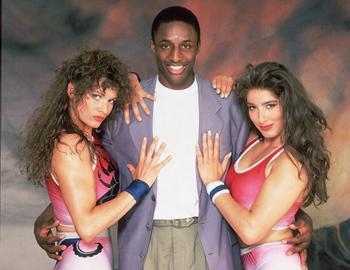 Host John Fashanu, with Miss Sassy and Miss Sunshine.
Host John Fashanu, with Miss Sassy and Miss Sunshine.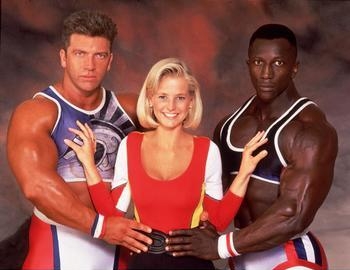 Host Ulrika Jonsson, with Mr Nice and Mr Nasty.
Host Ulrika Jonsson, with Mr Nice and Mr Nasty.See also
Weaver's Week review (2024 revival)
Videos
The very first episode that started the craze.

